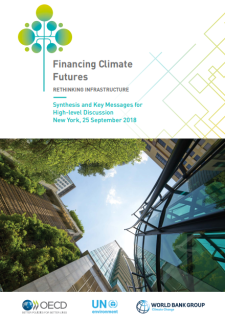
The OECD, UN Environment and the World Bank Group have joined forces under a new initiative – Financing Climate Futures: Rethinking Infrastructure. The initiative explores what public and private actors should do to trigger the radical transformation needed to align financial flows in infrastructure for a low-emission, resilient development.
The initiative, supported by the German Federal Ministry of the Environment, Nature Conservation and Nuclear Safety (BMU), stems from the 2017 G20 Hamburg Climate and Energy Action Plan, which called on the three organisations to “compile ongoing public and private activities within the G20 for making financial flows consistent with the Paris goals and, building on this, to analyse potential opportunities for strengthening these efforts”.
This synthesis report identifies six transformative areas that have the potential to help the different financial actors move beyond an incremental approach to the low-carbon transition towards the transformational agenda needed for decisive action.
In addition to this synthesis, the Financing Climate Futures initiative consists of the following components:
- Shifting the Lens, a UN Environment analysis that explores the benefit of scenarios and foresight approaches in supporting the lowemission, resilient transition
- A series of case studies that dive deeper in specific aspects of these recommendations:
- Specific jurisdictions: Financing climate objectives in cities and regions to deliver sustainable and inclusive growth (OECD); Financing Resilient Urban Infrastructure: Lessons from World Bank and Global Experience (World Bank Group); Greening the Belt and Road Initiative (UN Environment)
- Technologies: Blockchain, infrastructure and the low-emission transition (OECD); Decarbonising energy intensive industries: options and strategies (Imperial College); How digital finance favours infrastructure investments, decarbonisation and energy access to all (UN Environment)
- Development finance: Mobilising commercial capital for sustainable infrastructure: Insights from national development banks in Brazil and South Africa (OECD); Achieving Clean Energy Access in Sub-Saharan Africa (Jan-Corfee Morlot & Carbon Limits Nigeria)
The final report, which will be launched at COP24 in Poland in December 2018
